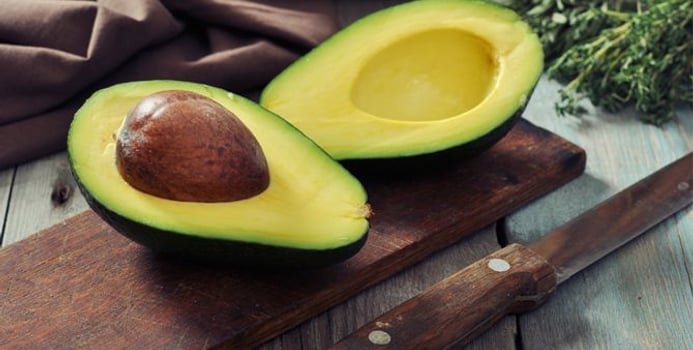Avocado may be considered an oddball of a fruit, due to its rich, oily flavor and high fat content, but it is full of nutritional food value. The fruit contains the good, healthy monounsaturated fat found in nuts and olive oil and provides a very beneficial way to integrate necessary fat into your diet. Eat avocados whole, slice them up into salads or sandwiches, or eat them as guacamole as an effortless way to boost heart health.
Why Is Avocado a Good Fat?
Look to avocados to help get to the 65 grams of fat recommended in a 2,000 calorie diet. Fats have historically been blasted by many in diets as, well, leading to fat on your body, but the component is necessary to several key body functions. Fat intake in food is essential for the proper absorption of fat-soluble vitamins and also provides your body with the energy necessary to get through the day. They also help maintain body cells and membranes and insulate vital organs. But, the bad saturated and trans fats are the ones that give all fats a bad reputation.
The monounsaturated fat that makes up the majority of avocados-about 75 percent of its calories-can work to prevent heart disease or even strokes. Regular consumption of the fruit has also been found to lower cholesterol, in the especially effective way of increasing the ratio of good HDL levels to bad LDL levels. High Vitamin E content typically comes alongside the monounsaturated fat, making avocados an excellent antioxidant. Consuming avocados are an especially effective way for vegans or vegetarians to obtain the fat they would otherwise miss out on from animal proteins.
How Much Is Too Much?
There is still a limit to what is typically recommended for your fat consumption, even if it is good fat that you are consuming. Keep that in mind when deciding how much avocado to eat. Also, be sure to consider the calories in avocados, which are about 240 per every 1-cup serving, as you're counting daily calorie consumption. While avocados are a very heart-healthy way to get the fat your body needs to function and should certainly have a place in your diet, overdoing the amount of avocado you consume and blowing through typical calorie or fat-percentage limits will most likely inhibit any weight-loss plan.
Experts recommend about a third of your daily calorie intake comes from fats, which is about 65 grams. One serving of avocado has about 22 grams of fat, or a third of your daily fat allotment. If you're planning on consuming a lot of other fats, such as olive oils and nuts in a day, trying cutting the recommended serving of avocado in half in order to still enjoy it within your limits.
How to Eat Them?
Be conscious to replace avocados for foods with little redeeming nutritional value. Snack on guacamole instead of sour-cream or cream-cheese based dips. Smooth avocados over bread as a substitute to butter or mayonnaise on sandwiches. Slice avocados on top of a veggie or turkey burger for a heart-friendly alternative to a cheeseburger. The fruit provides a very flavorful way to give your body what it needs.



